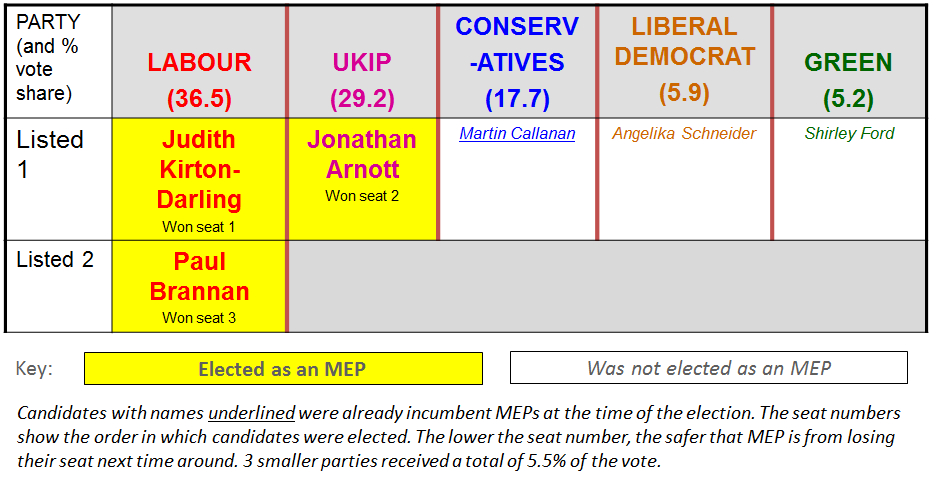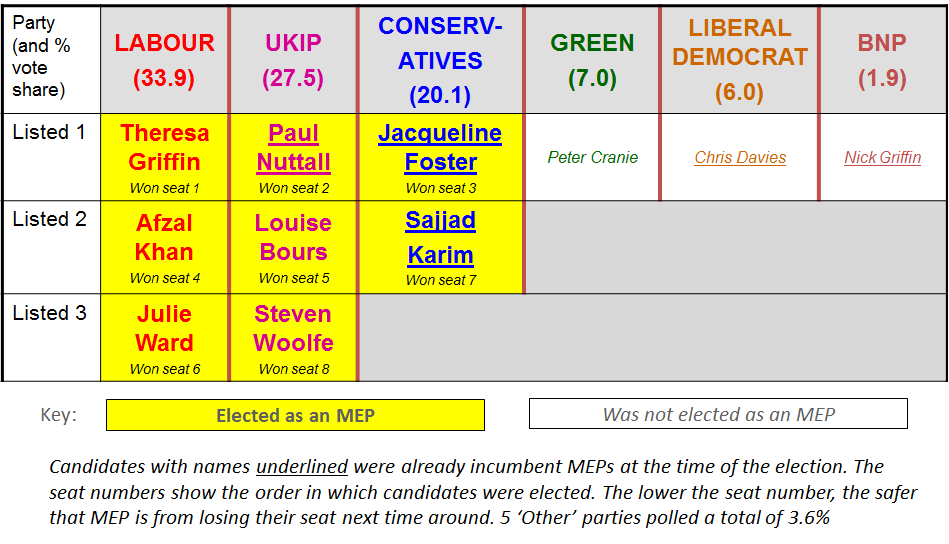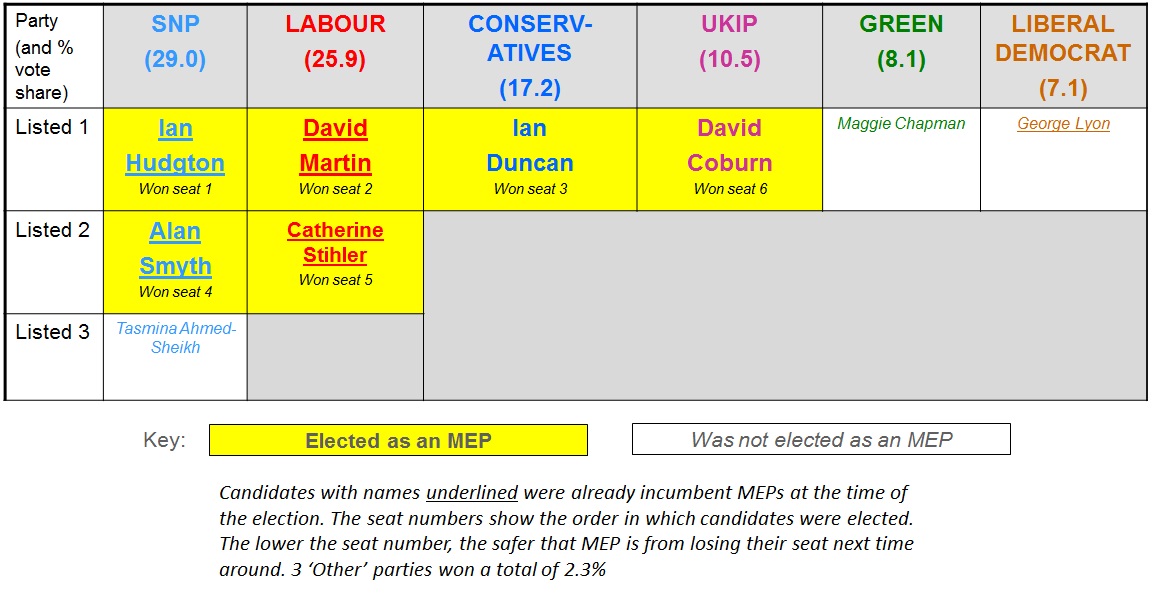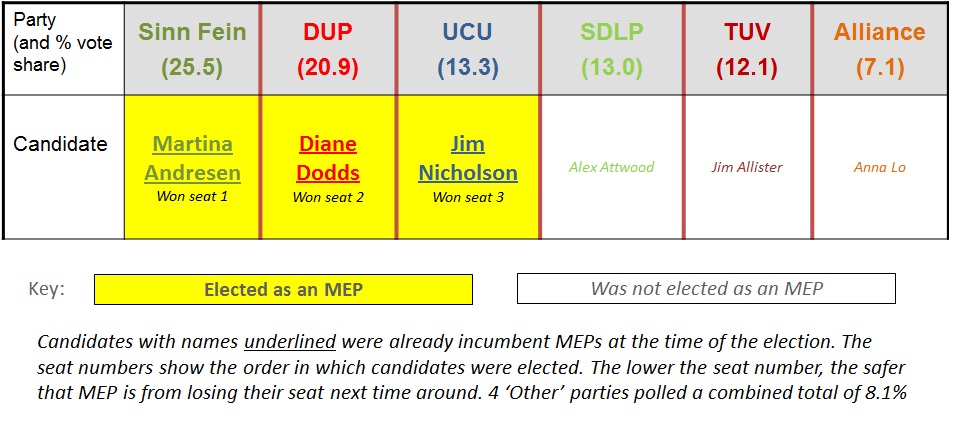Euro elections – find out about your new MEPs in the North East, North West, Scotland and Northern Ireland
Democratic Audit has recently been engaged in finding ways to improve the information that voters receive in the aftermath of elections. Having already previewed the contests by region, and provided information as to what happened in England’s southernmost regions and the Midlands, Wales, and Yorkshire and the Humber, the Democratic Audit team are providing brief details and links to learn more about all the new MEPs elected on May 22nd. In the final instalment of our mini-series on the results of the European Parliament elections, we look at what happened in the the North East, North West, Scotland, and Northern Ireland.
The North East (3 MEPs)
Full election results for the region can be found on Wikipedia here
Labour’s MEPs for the North East

 Labour performed strongly in the region, and thus saw two of their candidates elected. Judith Kirton-Darling topped Labour’s list, winning the first seat available. She is currently Confederal Secretary of the European Trade Union Congress. She has worked in the trade union and labour movements for 15 years in a variety of roles, and was particularly active during the ‘save our steel’ campaign. Her Twitter profile is here.
Labour performed strongly in the region, and thus saw two of their candidates elected. Judith Kirton-Darling topped Labour’s list, winning the first seat available. She is currently Confederal Secretary of the European Trade Union Congress. She has worked in the trade union and labour movements for 15 years in a variety of roles, and was particularly active during the ‘save our steel’ campaign. Her Twitter profile is here.
Paul Brannan was also elected. He is a former candidate for the Parliamentary seats of Hexham and Berwick-upon-Tweed, and a former Newcastle City councillor. He has extensive campaign experience, including within the Anti-Apartheid Movement, the Labour Party and Christian Aid, and his Twitter profile is here.
UKIP’s MEP for the North East
 Jonathan Arnott claimed the second seat on offer, following a very strong showing from UKIP in the region. He is a former maths teacher from Sheffield. He contested Sheffield Attercliffe in 2005 for UKIP, then Sheffield South East in 2010; he also stood at the South Yorkshire Police Commissioner election 2012 and the Yorkshire region for UKIP in the 2004, and 2009 European elections. His Twitter profile is here.
Jonathan Arnott claimed the second seat on offer, following a very strong showing from UKIP in the region. He is a former maths teacher from Sheffield. He contested Sheffield Attercliffe in 2005 for UKIP, then Sheffield South East in 2010; he also stood at the South Yorkshire Police Commissioner election 2012 and the Yorkshire region for UKIP in the 2004, and 2009 European elections. His Twitter profile is here.
Who lost out in 2014?
Due to a combination of incumbents stepping down, and the results themselves, the North East will be represented in the European Parliament by three completely new MEPs. Part of the reason for this was the defeat of the region’s only Conservative MEP Martin Callanan, who led the Conservatives and Reformists grouping in the European Parliament. Callanan is now being talked of as a potential European Commissioner.
The Liberal Democrats were previously represented by Fiona Hall, but her replacement as the top Liberal Democrat candidate Angelika Schneider did nowhere near well enough to claim a seat. Nor, for what matter, did the Greens, who despite coming ahead of the Liberal Democrats were a long way from doing well enough to increase their representation in Brussels.
About the region
The North east region is the most northerly and smallest of all the English regions, stretching from the Tees Valley in the south, to the border between Northumberland and Scotland border in the north. You are in the North East region if you live in the Tees Valley, County Durham, Northumberland, or any of the Tyne and Wear local authorities.
—
The North West (8 MEPs)
Full election results for the region can be found on Wikipedia here.
Labour’s MEPs for the North West


 Elected for Labour in the first seat available was Theresa Griffin. She is a trade unionist and Labour Party campaigner of long standing. She served on Liverpool City Council during the 1990s. Her Twitter account is here.
Elected for Labour in the first seat available was Theresa Griffin. She is a trade unionist and Labour Party campaigner of long standing. She served on Liverpool City Council during the 1990s. Her Twitter account is here.
Azfal Khan was second on Labour’s list, and was comfortably elected, winning the fourth seat available. He is a councillor in Manchester (a Labour local government stronghold), and a former Lord Mayor of the city, the first of Asian or Muslim descent. He has also worked as a solicitor, and has been honoured with an MBE for his services to race relations in Britain. He is on Twitter, and his account is here.
Julie Ward is third on Labour’s list. A strong showing from the party in the region saw to it that she was elected in the sixth seat available. She describes herself as a poet and community activist. She ran a regional arts and disability charity in the North East for a number of years, before moving to the North Pennines.
UKIP’s MEPs for the North West


 UKIP also saw three candidates elected. Their list was topped by Paul Nuttall, who is the party’s Deputy Leader, and was first elected to Brussels in 2009. His Votewatch EU profile is here, giving full information about his record in the European Parliament. His Twitter account is here.
UKIP also saw three candidates elected. Their list was topped by Paul Nuttall, who is the party’s Deputy Leader, and was first elected to Brussels in 2009. His Votewatch EU profile is here, giving full information about his record in the European Parliament. His Twitter account is here.
Louise Bours (who has previously gone by the name Louise Van Der Bours) was elected for UKIP in the fifth available seat. She is currently a councillor in Congleton.
Steven Woolfe was the third candidate elected for UKIP in the region, with their strong showing ensuring they are also represented by three MEPs in Brussels. He has worked as a criminal lawyer and as a regulatory lawyer in the City of London. He is the party’s primary spokesman on financial matters, and his Twitter account is here.
The Conservatives’ MEPs for the North West

 Jacqueline Foster was the first of two candidates to be elected for the Conservatives, claiming the third seat on offer. She was first elected in 1999 before being defeated in 2004, and then elected again in 2009. In Brussels she is Deputy Leader of the Conservative MEPs and their spokesperson on transport and tourism. The well respected independent research organisation Votewatch EU provides details of all MEPs in the European Parliament, and her profile is here. She is also on Twitter here.
Jacqueline Foster was the first of two candidates to be elected for the Conservatives, claiming the third seat on offer. She was first elected in 1999 before being defeated in 2004, and then elected again in 2009. In Brussels she is Deputy Leader of the Conservative MEPs and their spokesperson on transport and tourism. The well respected independent research organisation Votewatch EU provides details of all MEPs in the European Parliament, and her profile is here. She is also on Twitter here.
Sajjad Karim also won re-election for the Conservatives. He was first elected to the Parliament in 2004, the first British Muslim elected to Brussels. He is now legal affairs spokesperson for the Conservatives and Reformists group and his Votewatch EU profile is here. He is also on Twitter account here.
Who lost out in 2014?
The incumbent MEP Chris Davies lost his seat, following the collapse of the Liberal Demcorats vote in the region. They were pushed into fourth place by the Green party, but their candidate Peter Crainie did not do well enough to be competitive for a seat.
Labour would have hoped to have seen their fourth place candidate Wajid Khan elected, but ultimately Labour’s victory margin was not quite large enough.
Finally, Nick Griffin, the controversial Chairman of the far right British National Party was unable to buck the nationwide trend which saw his party collapse in the polls.
About the region
The North West encompasses all of the land from the North West Scottish border down to the south border of Cheshire. It includes the large cities of Manchester, Liverpool and Carlisle, and the counties of Cumbria, Cheshire, Lancashire, and Merseyside, as well as the Unitary Authorities Cheshire East, Cheshire West and Chester, Halton, Warrngton, Blackpool, and Blackburn with Darwen.
—
Scotland (6 MEPs)
Full election results for the region can be found on Wikipedia here.
The SNPs MEPs for Scotland
![]()
 Ian Hudghton comfortably won re-election for his party, winning the first seat available. He was first elected as an MEP in 2004 at a by-election. The independent organisation Votewatch EU has detailed information about his activities in the European Parliament, where he is Vice-President of the European Free Alliance grouping, part of the Greens/EFA Group and a member of the Fisheries and the Internal Market & Consumer Protection Committees. He is on Twitter, and his profile page is here.
Ian Hudghton comfortably won re-election for his party, winning the first seat available. He was first elected as an MEP in 2004 at a by-election. The independent organisation Votewatch EU has detailed information about his activities in the European Parliament, where he is Vice-President of the European Free Alliance grouping, part of the Greens/EFA Group and a member of the Fisheries and the Internal Market & Consumer Protection Committees. He is on Twitter, and his profile page is here.
Alyn Smith, also an incumbent MEP since 2004, won re-election comfortably. He won the fourth seat on offer. Prior to his election he worked for the SNP in a number of capacities. In the European Parliament, he is a member of the Agriculture and Rural Development committee. More information about his activities in the Parliament can be found on his Votewatch EU site here. His Twitter account can be accessed here.
Labour’s MEPs for Scotland

 David Martin, Labour’s top candidate for Scotland at these elections, also won re-election comfortably. He won the second seat available. He has been an MEP since 1984, when he represented Lothians (prior to the introduction of the reformed electoral system for European elections in 1999). He was formerly Labour’s leader in the European Parliament and a Vice-President of the European Parliament between 1984 and 2009. In 2002 he was the defeated Socialist candidate for the President of the Parliament. His Votewatch EU profile provides more information about his record and activities in the Parliament. He is also on Twitter.
David Martin, Labour’s top candidate for Scotland at these elections, also won re-election comfortably. He won the second seat available. He has been an MEP since 1984, when he represented Lothians (prior to the introduction of the reformed electoral system for European elections in 1999). He was formerly Labour’s leader in the European Parliament and a Vice-President of the European Parliament between 1984 and 2009. In 2002 he was the defeated Socialist candidate for the President of the Parliament. His Votewatch EU profile provides more information about his record and activities in the Parliament. He is also on Twitter.
Catherine Stihler also won re-election, from her position as second on Labour’s Scotland list. She has been an MEP since 1999, and was previous the President of the National Union of Students (NUS). She has served as the Deputy Leader of the EPLP and held positions as Labour’s European spokesperson on health and fisheries. She is currently Labour’s European spokesperson on consumer rights and serves on the economic and monetary affairs committee. Her Votewatch EU profile provides full details of her activities in the European Parliament. Her Twitter profile is here.
The Conservatives MEP for Scotland
 Elected for the Conservative Party is Dr Ian Duncan, who replaced the long-serving Struan Stephenson who stepped down. He was previously deputy chief executive of the Scottish Fishermen’s Federation, a position he held for four years, and later Head of Policy & Communication for the Scottish Refugee Council. He was also the head of the Scottish Parliament’s office in Brussels and latterly a clerk to the Parliament’s European Committee and advisor to the Parliament.
Elected for the Conservative Party is Dr Ian Duncan, who replaced the long-serving Struan Stephenson who stepped down. He was previously deputy chief executive of the Scottish Fishermen’s Federation, a position he held for four years, and later Head of Policy & Communication for the Scottish Refugee Council. He was also the head of the Scottish Parliament’s office in Brussels and latterly a clerk to the Parliament’s European Committee and advisor to the Parliament.
UKIP’s MEP for Scotland
David Coburn was UKIP’s top candidate for the region. He surprised many by claiming the final (sixth) seat on offer. He is the London Regional Chair of the Party, and a former Territorial Army soldier. His selection proved controversial due to his status as a relative newcomer to Scottish politics. Scotland is not strong territory for UKIP, and it is unlikely that the party’s expected surge will make much of an impact north of the border.
Who lost out in 2014?
The SNP had hoped to see their third placed candidate Tasmina Ahmed-Sheikh elected, but UKIP’s stronger than expected performance ensured that their representation in the European Parliament will remain the same as it was before the election. The incumbent Liberal Democrat MEP George Lyon also lost his seat, following the collapse of his party’s vote. The Green Party performed well enough to finish fourth, but not ultimately well enough to claim a seat.
About the constituency
Scotland’s territory is well known, bordering Northumberland and Cumberland to the South. It contains the large cities of Glasgow and Edinburgh and the central belt, plus Aberdeen, Inverness and Dundee, as well as vast rural areas in the highlands, the border country and Orkney and Shetland.
—
Northern Ireland constituency (3 MEPs)
In common with the rest of the United Kingdom, Northern Irish voters elected their MEPs on the 22nd May, but they did so as the only constituency to use the Single Transferable Vote system of electing their representatives. More information about the voting system can be found on our preview for the seat. This system, however, means that each party puts forward a single candidate for the election. Full details of the outcome of the election in Northern Ireland can be found on Wikipedia, here.
Sinn Fein’s MEP for Northern Ireland
 Sinn Fein’s incumbent MEP Martina Anderson won the most votes for the constituency, ending up with 25.5%. She was initially elected to the European Parliament at a by-election in 2012. Prior to this, she was a Member of the Northern Ireland Legislative Assembly. Information about her record in the European Parliament has been collected by the independent and well respected organisation Votewatch EU. She is on Twitter here.
Sinn Fein’s incumbent MEP Martina Anderson won the most votes for the constituency, ending up with 25.5%. She was initially elected to the European Parliament at a by-election in 2012. Prior to this, she was a Member of the Northern Ireland Legislative Assembly. Information about her record in the European Parliament has been collected by the independent and well respected organisation Votewatch EU. She is on Twitter here.
The Democratic and Unionist Party (DUP)’s MEP for Northern Ireland
 Diane Dodds came second in the election, winning 20.9% of the vote. She was first elected as an MEP in 2009. More information about her record in the European Parliament since her election can be found on her Votewatch UE profile, which is here. She was previously a councillor and teacher in Northern Ireland. More information about her can be found here and she’s on Twitter here.
Diane Dodds came second in the election, winning 20.9% of the vote. She was first elected as an MEP in 2009. More information about her record in the European Parliament since her election can be found on her Votewatch UE profile, which is here. She was previously a councillor and teacher in Northern Ireland. More information about her can be found here and she’s on Twitter here.
The Ulster Conservative and Unionist Party (UCU)’s MEP for Northern Ireland
 Jim Nicholson, the UCU’s MEP for the constituency came third, winning 13.3% of the vote. He was first elected in 1989 and re-elected in subsequent European Parliamentary Elections. Fulldetails about his record as an MEP can be found on his Votewatch EU profilehere. His Twitter account ishere. He can be confident of winning re-election.
Jim Nicholson, the UCU’s MEP for the constituency came third, winning 13.3% of the vote. He was first elected in 1989 and re-elected in subsequent European Parliamentary Elections. Fulldetails about his record as an MEP can be found on his Votewatch EU profilehere. His Twitter account ishere. He can be confident of winning re-election.
Who lost out in 2014?
The only two candidates who held a realistic chance of breaking through to win a seat were the SDLP’s Alex Attwood, who narrowly missed out when he won 13% of the vote. The Traditional Unionist Voice candidate Jim Allister came fifth, winning 12.1% of the vote.
About the constituency
The boundaries of Northern Ireland are well known, bordering the Irish counties of Louth, Monaghan, Cavan, Leitrim, and Donegal to the South and West. It is divided from the rest of the UK by the Irish Sea. Belfast is its capital and largest city.
—
Click here to see our post-election briefings for East of England, London, and the South East and South West, and the East and West Midlands, Yorkshire and the Humber, and Wales.
Note: please read our comments policy before posting. Cover photo image credit: El_Sol, CC BY SA 2.0. The shortened URL for this post is: https://buff.ly/1pAVunh










 Democratic Audit's core funding is provided by the Joseph Rowntree Charitable Trust. Additional funding is provided by the London School of Economics.
Democratic Audit's core funding is provided by the Joseph Rowntree Charitable Trust. Additional funding is provided by the London School of Economics.
Find out about the new MEPS NW, NE and Scotland. https://t.co/Ao87T4p7oy
The final installment in our round-up of who the UKs new MEPs are is now online https://t.co/q1pHmvGpVV
Euro elections – find out about your new MEPs in the North East, North West, Scotland and Northern Ireland https://t.co/oGszg2kMkK
Euro elections – find out about your new MEPs in the North East, North West, Scotland and Northern Ireland https://t.co/NSAW6XcEhx